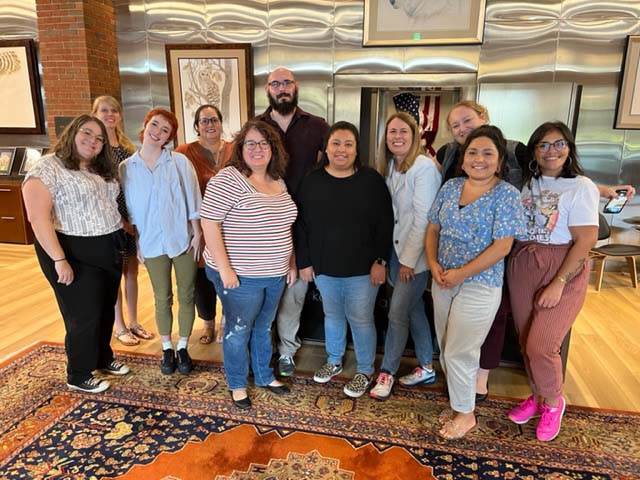UA Little Rock Tackles Behavioral Health Crisis through Internship Program
March 20-26, 2023
By Angelita Faller
The University of Arkansas at Little Rock has started a new internship program that is sending Master of Social Work (MSW) students out into the community to help combat the growing behavioral health crisis in Arkansas.
The internship program is funded by the Blue & You Foundation for a Healthier Arkansas, a charitable foundation established and funded by Arkansas Blue Cross and Blue Shield to promote better health in Arkansas. The foundation awarded UA Little Rock a $605,000 grantin 2021 to create an endowed program to help MSW students address the unmet need for behavioral health care in the state.
Through the School of Social Work’s Behavioral Health Integration Internship Program, MSW students at UA Little Rock receive special training before they intern directly with primary health care providers to provide mental and behavioral healthcare at doctors’ offices and clinics in Arkansas. All students work under the supervision of a social worker.
“I am so excited that we are providing education and training to prepare MSW students for this important role that mental health providers play in primary care,” said Kim Shuler, CEO for Arkansas Behavioral Health Integration Network (ABHIN) who provides training to the internship participants. “It’s just been the past few years that we have realized that there is no health without mental health. We need to train our workforce if we are going to address health in a different way. I think this internship program provides the next generation of the workforce who can address both the mental and physical health issues in primary care.”
The first two UA Little Rock MSW students who participated in the program worked in primary care placements during the spring 2022 semester. They were followed by five students – Leslie Beard, Amy Perez, Avis Phifer, Kat Roberts, and Michael Stoecker - who attended an intensive boot camp in August 2022. They received training in integrated behavioral health before starting their internships for the 2022-23 school year.
“The students are trained on integrated behavioral health care, the screening tools they can use in a primary health setting, and some of the solution-focused treatments they can give to the clients,” said Dr. Lindsay Ruhr, assistant professor of social work at UA Little Rock. “We also train our students to screen folks for suicide risk and what to do in that situation. We are helping our MSW students become active in clinics and primary care settings and to work closely with health care providers to help patients get the resources and care they need.”
Ruth Fissel, behavioral health program manager for University of Arkansas for Medical Sciences (UAMS), serves as a member of the School of Social Work Advisory Board and provides some education and training to the social work interns. The internship program is part of a holistic approach to health care that is centered around the patient’s well-being.
“We know that 50 percent of people who come into primary care have an undiagnosed behavioral health need,” Fissel said. “There is a stigma about receiving treatment for behavioral and mental health in small towns across Arkansas, and there is a concern about privacy. If you go to your doctor, no one will question why you are visiting your doctor, which is why it’s so beneficial to have social work interns set up in primary care settings in Arkansas.”
Not only do the interns provide screenings for depression, anxiety, and suicidal thoughts, they also provide brief interventions to help improve a patient’s well-being as well as referrals if the patients need more advanced care. Some of the things interns help patients address include insomnia, how to address the stress that comes with having a chronic illness like diabetes, and how to use tools like mindfulness to reduce anxiety.
“There is a lot of education, support, and strategies that go with improving their health,” Fissel said. “The bigger picture is promoting this program to clinics. In some areas of the country, this health model has been there for 15 or 20 years, and they show that it improves health outcomes for patients. When you provide other support services, the medical compliance and understanding of the patients takes hold, and the patient becomes more engaged in their health care.”
UA Little Rock students involved in the program can already see that they are making a positive impact in the community by providing behavioral health services to Arkansans in their primary care facilities.
“I fully believe in the importance of having mental wellness as a focus in primary care settings because mental and physical health impact one another,” said Leslie Beard, a MSW student from Monticello who is interning at UAMS’s 12th Street Clinic. “When primary care clinic staff receive educational trainings and add a behavioral health consultant to their team, they are much more equipped to adequately care for their patient’s overall needs.”
Beard has joined a behavioral health team that works with clients who have scored high on depression and anxiety screenings.
“Through my internship, I schedule sessions and have brief interventions where the client and I work together to set goals to address their presenting problems,” Beard said. “In the clinical setting, I am learning how to make assessments, interventions, utilize therapeutic skills during individual client sessions, and how to gather social resources for patients. Additionally, I sometimes help patients find resources in housing or applying for health insurance. I am also learning to assert myself as the asset I am to the 12th street team. The 12th Street Clinic has been an incredible and uplifting learning environment where I feel valued and respected as a part of the team.”
Michael Stoecker, a MSW student who lives in Conway, interns at North Hills Family Medical Center in North Little Rock. He meets with patients, conducts screenings to assess what help they need, and connects patients with resources.
“I’ve learned that a lot of people go to their primary doctor for depression, anxiety, and loss,” Stoecker said. “The major skill I am learning is to quickly assess someone and try to help them in half the time of a normal therapy session.”
Stoecker joined the internship program because it’s “worth a shot” to make himself better. While the internship is challenging, he’s glad to have the experience since he thinks that having behavioral health consultants in primary care practices “will become a more common practice of the behavioral health care world as we move forward.”
A new Blue & You Foundation grant of $60,200 will allow UA Little Rock social work professors to work with social work professors from the University of Arkansas to evaluate the program and the impact of social workers working in a primary care setting. The professors will study a variety of factors, including the challenges and the strengths of the integrated behavioral health internship program from the perspectives of the students, patients, and staff at the primary care clinics. The two-and-a-half year-long evaluation process will also explore venues for sustaining and possibly expanding the program.
“We want to provide better health outcomes for Arkansans by making mental health services available in the same space where their physical health needs are addressed,” Ruhr said. “This grant gives us the resources we need to make sure students are getting the skills they need to go out into the community and serve as behavioral health consultants who work closely with doctors, nurses, and social workers to provide Arkansans with the behavioral health services they require to reduce the behavioral health crisis in our state.”





